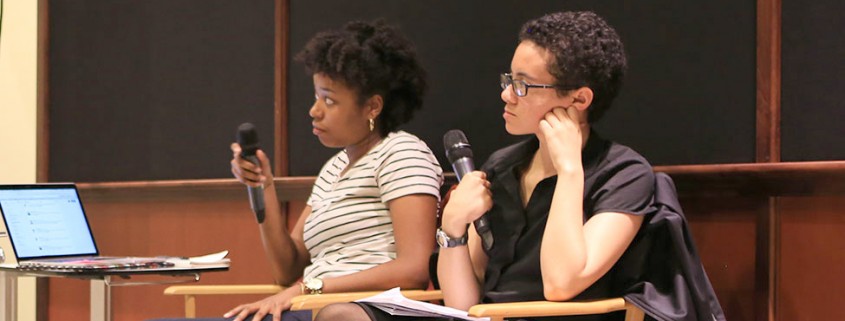SCA students discuss campus climate
Students, faculty and staff at the School of Cinematic Arts came together in a town hall style forum hosted by the SCA Council of Diversity to have an open discussion about inclusion in the school and the entertainment industry at large on Thursday. The agenda for the night included an open mic where students could share personal anecdotes and voice opinions relating to the state of diversity at SCA.
These conversations are part of an ongoing effort to address campus climate. Last fall, USC’s Provost Office issued a campus-wide memorandum on “access and opportunity, diversity and inclusion” on behalf of President Nikias and the entire USC student body.
Students at the town hall, which took place in the SCA Gallery, talked about how some stories never even have the opportunity to be told, specifically those authored by or for communities underrepresented in race, gender, sexual orientation or class.
Christopher Ortega, a black sophomore majoring in film and television production, said he felt that his stories were misunderstood by faculty members in a way that inhibited his artistic freedom. He explained how students of diverse backgrounds feel pressured to align their work with culturally dominant narratives featuring white, male, heterosexual characters and how a more diverse SCA faculty would improve that.
“More diversity at the faculty level would at least give a new perspective on how stories are told,” Ortega said.
In addition to a more diverse faculty, other students called for a reform of the films that are shown and discussed in SCA classes.
“We really need to make sure that we’re investing some time, energy and effort into seeing work from directors of color and marginalized voices that have been doing this work for a long time,” said Rachel Summers, a MFA production student.
The panel leaders ended the night with a summary of proposed initiatives to enhance diversity and inclusion at SCA. These included a push for a more diverse faculty and student body, diversity training for faculty and staff, reform of the major’s foundation course, Introduction to Cinema 190 and serious discussion about content in all classes.
Panel leader Funkster Scerbak, a sophomore majoring in interactive media and games, seemed optimistic about the changes that could be implemented at SCA to improve issues of diversity in the industry.
“We need to talk about accessibility that people have to cinema in the first place, and I think that SCA is a great place to start with that,” Scerbak said. “We need to bring in a lot of different people, and that’s where the argument of merit versus race is kind of bogus, because context is invariably more important than merit or race.”

